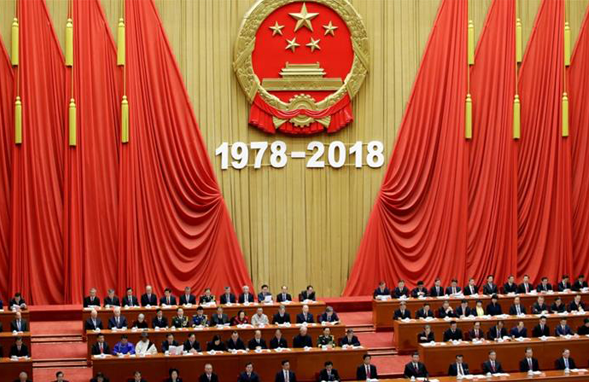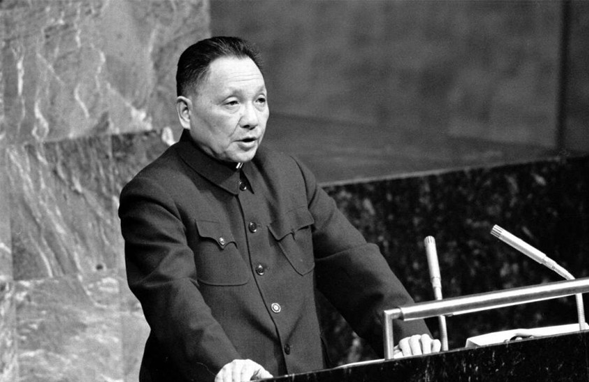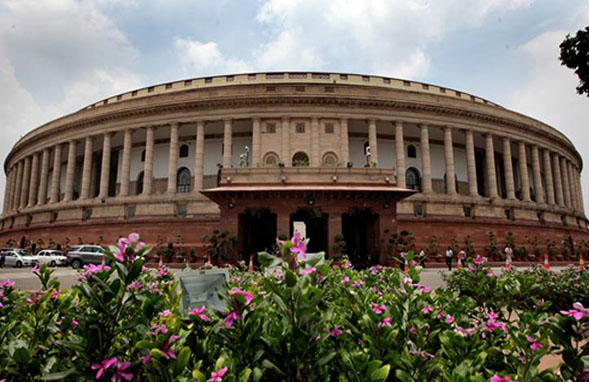

Decades after the People’s Republic of China was established in 1949, and after the Mao Zedong personality-cult aftermath, Communist Party leader Deng Xiaoping opened up China to capitalist market reforms. President Xi Jinping gave key address to mark this occasion at the Great Hall of the People in Beijing.
The year 2018 marks the 40th anniversary of the market reforms that would transform China from a poor country to that having around 18 percent share in the world’s economy. The leader who heralded this revolution was Deng Xiaoping, who called this new system “socialism with Chinese characteristics”.
After decades of war and Leftist campaigns such as the Great Leap Forward and the Cultural Revolution, which killed tens of millions of people, rendered multitudes destitute and blocked economic growth, in 1978, the Central Committee of the Communist Party convened to make paradigm-altering changes to its ideology and economic practices. Without altering the fundamental socialist hold over the country, it was decided to open up Chinese economy to foreign investments by establishing economic zones such as those in Shenzhen, Zhuhai, Shantou and Xiamen. Eventually, bolder reforms were also initiated such as large-scale privatisation of state-owned enterprises, loosening of state control in many economic and social activities, legalising private ownership and allowing market competition. Due to these reforms, now widely considered a success, the gross domestic product of China increased ten-fold, and China achieved the fasted expansion of its economy in history. These developments lifted 800 million people out of poverty. After a share of mere 1.8 percent in 1978, China is now the second-largest economy of the world after the USA.
Ezra Vogel, Emeritus professor of social sciences at Harvard University, said Deng’s approach unleashed much of that change. “The success of Deng’s reform and opening policies – which brought a fundamental change in policies from the previous 20 years of excessive leftism and allowed Chinese to learn recent developments in science, technology, and management from the entire world – provided the base for rapid economic growth that enabled China to achieve unprecedented growth for four decades,” Vogel said.

A Guangzhou-based historian Yuan Weishi said that “originally the most important feature of socialism was state ownership, but Deng set aside the debate about ownership. Another feature was the planned economy, but Deng dismissed these two features of socialism. All he was talking about was to unleash the productivity [of a country].” This cuts right into the capitalist vs. socialist debate, which, according to Deng, could not destroy the fact that development was the hard truth, and both economic success and socialist principles could work side-by-side to achieve it. Weishi adds that it is this pragmatic approach, perhaps also guided by Soviet Union’s failures, which saved China. “Without Deng, the Communist Party would have been over even before the end of the Soviet Union.”
Yet, this development has come with a price, such as excessive levels of pollution: Chinese cities regularly face impending haze and smog. Millions of villages and archaeological remains have been sacrificed at the altar of rapid urbanisation and development. One example is the massive Three Gorges Dam on the Yangtze River – the largest hydroelectric dam in the world – for which 13 cities and 140 towns were submerged, and 1300 of archaeological artefacts were also drowned. 30 million people continue to live in poverty too, mostly in the underdeveloped rural areas. Moreover, one-third of the country’s wealth is owned by the richest 1 percent of the populace, and many socio-economic problems remain to be confronted.
Nevertheless, China’s economic progress has tilted the world order and the country will only continue to influence the world economy thereon.








